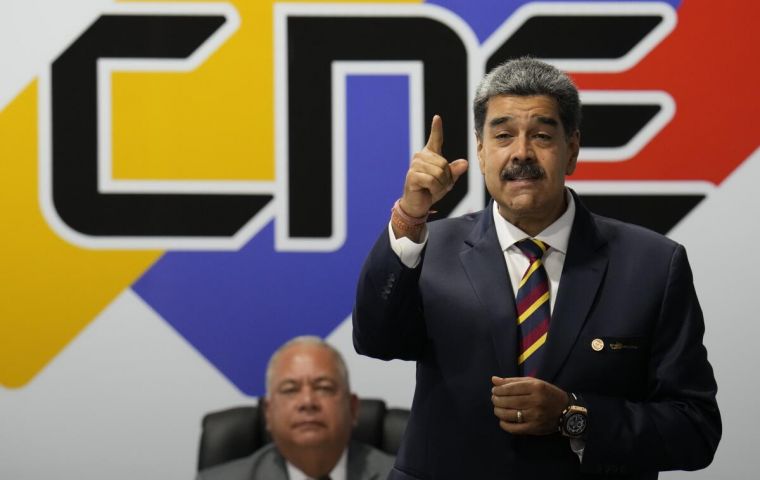MercoPress. South Atlantic News Agency
Venezuela's Maduro agrees to resume talks with US
 “After thinking about it for two months I have accepted,” Maduro said
“After thinking about it for two months I have accepted,” Maduro said Venezuelan President Nicolás Maduro announced Monday that he would be seeking to resume talks with the United States this week while his government referred to the European Union as one of the “most inefficient organizations in the world” less than a month ahead of local elections whereby the head of state intends to secure another term in office amid disenfranchised opposition leaders.
The Venezuelan regime has been at odds with Brussels since an arms embargo coupled with sanctions handed down against officials and members of the ruling party, including the freezing of their assets and accounts in EU territory in addition to banning them from entering EU member countries.
“I have received the proposal for two continuous months from the Government of the United States to reestablish talks and direct dialogue, after thinking about it for two months I have accepted, next Wednesday the talks with the US will restart,” Maduro said Monday in his weekly TV show.
He added that this new round of negotiations would be for the United States “to comply with the agreements signed in Qatar and to reestablish the terms of the dialogue with respect, without manipulations.”
“We are going to debate and seek new agreements so that what was signed in Qatar is fulfilled, I want dialogue, I want understanding. I want a future for our relations, I want changes; that yes, under the absolute sovereignty and independence of Venezuela,” insisted Maduro, who also explained that joining him in these meetings would be National Assembly Speaker Jorge Rodríguez and Miranda State Governor Héctor Rodríguez.
In March 2022, a White House delegation traveled to Caracas for talks that have since had some ups and downs. Many gatherings have since occurred, leading to the partial lifting of US sanctions against Venezuela last October. But that move was reversed after six months given Caracas' failure to comply with the Barbados Agreement with the opposition for free and open elections, as the banning of María Corina Machado and other leaders would prove.
Still, Venezuela got Colombian businessman Alex Saab released from a US prison in Miami in exchange for some 30 people held by the Socialist government.
Speaking on behalf of Venezuela's ruling United Socialist Party (PSUV), Congressman Diosdado Cabello claimed the EU was good only “to walk behind the United States” and “they think they are going to give us lessons, they cannot give us lessons on anything.”
He also pointed out that Venezuela was not holding elections so that “sanctions are lifted” but because it is what is “due.” He also foresaw that the observation missions from organizations such as the Carter Center, the United Nations, and the Council of Electoral Experts of Latin America, would be finding them to be the “cleanest” in history.
Cabello made these remarks after Venezuela's National Electoral Council (CNE) took back a previous invitation to the EU to monitor the July 28 elections in response to sanctions harming the country's economy and the Venezuelan people, according to CNE Chairman Elvis Amoroso.




Top Comments
Disclaimer & comment rulesCommenting for this story is now closed.
If you have a Facebook account, become a fan and comment on our Facebook Page!